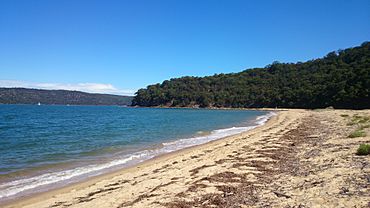Patonga, New South Wales facts for kids
Quick facts for kids PatongaCentral Coast, New South Wales |
|||||||||||||||
|---|---|---|---|---|---|---|---|---|---|---|---|---|---|---|---|
 |
|||||||||||||||
| Population | 206 (2016 census) | ||||||||||||||
| Postcode(s) | 2256 | ||||||||||||||
| Elevation | 4 m (13 ft) | ||||||||||||||
| Location | |||||||||||||||
| LGA(s) | Central Coast Council | ||||||||||||||
| Parish | Patonga | ||||||||||||||
| State electorate(s) | Gosford | ||||||||||||||
| Federal Division(s) | Robertson | ||||||||||||||
|
|||||||||||||||
Patonga is a small, charming village located on the Central Coast of New South Wales, Australia. It's a popular spot for fishing and holidays, nestled right by Brisk Bay and the mouth of the Hawkesbury River. Patonga is the most southern village on the Central Coast and is part of the Central Coast Council local area.
Contents
Exploring Patonga's Location
Patonga is a peaceful community by the bay. It sits on a sandy strip of land about one kilometer long. This strip stretches from the rocky hills of the Brisbane Water National Park in the north. It goes all the way to the mouth of Patonga Creek. This creek flows into the Hawkesbury River at Broken Bay.
Patonga has two waterfronts. To the east, you'll find a beach facing Brisk Bay. To the west, there's a sandy shore along Patonga Creek.
You can reach Patonga by driving along Patonga Drive from Umina to the north. Another way is by ferry from Palm Beach. You can also arrive by private boat. Some homes in Patonga Creek can only be reached by water.
Many bush tracks let you hike into Patonga and the nearby nature areas. There's also a walking track that leads to the nearby village of Pearl Beach. This track is considered to be of medium difficulty.
Patonga is still a fishing village today. It's also a favorite getaway for people from Sydney and other holidaymakers. The Patonga Creek used to be deep enough for large boats. Now, it's usually about half a meter deep.
Nearby towns like Umina Beach and Ettalong Beach offer more shops and services. These are things you might not find in Patonga itself.
What Does "Patonga" Mean?
The name Patonga comes from the language of the Darkinjung people. It means "oyster". On early maps of the area, Patonga was sometimes spelled "Betonga".
Things to Do and See in Patonga
Oyster farming is a main industry here. People also visit for nature tourism and fun holidays.
Visitors come from the Central Coast, Sydney, and Newcastle. They enjoy the Boathouse Hotel and Kiosk. The hotel has a restaurant and some rooms to stay in. Patonga also has a few art galleries to explore.
For fun and activities, Patonga offers:
- A sports oval
- A public boat ramp on the eastern side of the village
- Tennis courts
- A public wharf
- A two-hectare camping and caravan park at the southern end of the village
Ferries use the wharf to take people to Palm Beach and Newport. These places are on the Northern Beaches. When you visit Patonga, you can go canoeing, boating, fishing, and hiking.
Getting Around Patonga
Busways operates one bus route that goes through Patonga:
- 54: Patonga to Woy Woy via Pearl Beach
Patonga in Movies and TV Shows
Patonga has been a filming location for many movies and TV shows. In 1996, it was the setting for the fishing village of Graves Point. This was for a TV movie called 'The Beast'. This movie was about a giant squid that threatened a small town. The seaside cottage built for the film near the wharf was taken down after filming.
Patonga has also appeared in other well-known productions. These include "Oyster Farmer," "Micro Nation," and "Home and Away."
 | Shirley Ann Jackson |
 | Garett Morgan |
 | J. Ernest Wilkins Jr. |
 | Elijah McCoy |


